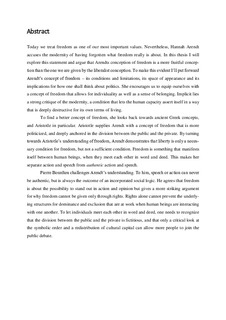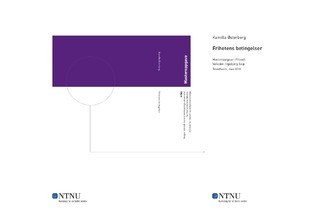| dc.description.abstract | Today we treat freedom as one of our most important values. Nevertheless, Hannah Arendt accuses the modernity of having forgotten what freedom really is about. In this thesis I will explore this statement and argue that Arendts conception of freedom is a more fruitful con-ception than the one we are given by the liberalist conception. To make this evident I’ll put forward Arendt’s concept of freedom – its conditions and limitations, its space of appearance and its implications for how one shall think about politics. She encourages us to equip our-selves with a concept of freedom that allows for individuality as well as a sense of belonging. Implicit lies a strong critique of the modernity, a condition that lets the human capacity assert itself in a way that is deeply destructive for its own terms of living.
To find a better concept of freedom, she looks back towards ancient Greek concepts, and Aristotle in particular. Aristotle supplies Arendt with a concept of freedom that is more politicized, and deeply anchored in the division between the public and the private. By turn-ing towards Aristotle’s understanding of freedom, Arendt demonstrates that liberty is only a necessary condition for freedom, but not a sufficient condition. Freedom is something that manifests itself between human beings, when they meet each other in word and deed. This makes her separate action and speech from authentic action and speech.
Pierre Bourdieu challenges Arendt’s understanding. To him, speech or action can never be authentic, but is always the outcome of an incorporated social logic. He agrees that free-dom is about the possibility to stand out in action and opinion but gives a more striking argu-ment for why freedom cannot be given only through rights. Rights alone cannot prevent the underlying structures for dominance and exclusion that are at work when human beings are interacting with one another. To let individuals meet each other in word and deed, one needs to recognize that the division between the public and the private is fictitious, and that only a critical look at the symbolic order and a redistribution of cultural capital can allow more peo-ple to join the public debate. | nb_NO |

